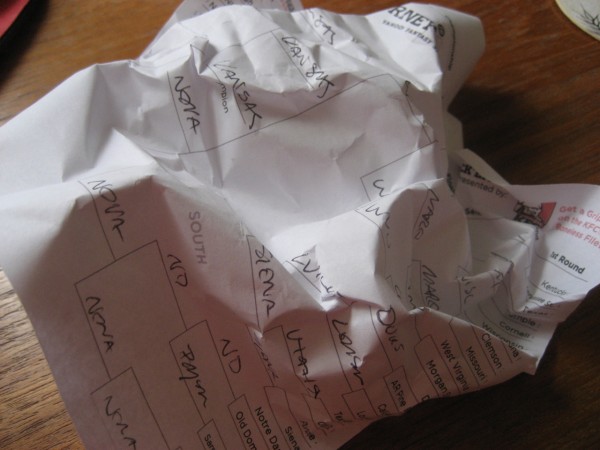Answering That All-Important Question: What About My Bracket?
Posted by rtmsf on November 18th, 2010Andrew Murawa is an RTC contributor.
When the format of the new 68-team NCAA tournament bracket was announced back in July, we wondered exactly what type of effect this would have on our bracket pools. With just one opening round game in the past ten years (since the expansion of the tournament field from the sensible 64 teams to the odd 65 team field in 2001), that opening round game in Dayton was safely ignored by the vast majority of the college basketball fanbase. But when the NCAA announced that the First Four would not only include a couple of games between the four lowest-seeded automatic bid earners, but also two games between the last four at-large teams, ignoring the opening round games for bracket pools no longer seemed to be a viable option. With the odds of one of those final four at-large teams advancing not only past the opening round game, but then beating their higher seeded opponent in the second-round game (the Thursday/Friday set of games, which in the past was considered the First Round, but is now officially the Second Round) being fairly reasonable, we wondered how some of the larger online NCAA bracket pools would handle this situation. The early answer? Continue ignoring the opening round games.
“We’re not set in stone, but we’re leaning towards not using those opening round games, similar to what we’ve done in the past,” said Jason Waram, Vice President of ESPN Fantasy Sports. “Basically, the player would get both of those two teams (in the opening round game) for the price of one.” In other words, if you fill out your bracket prior to the completion of the Opening Round game, and you wish to select one of the participants in the opening round game to advance, say to the Sweet 16, you would get both teams. As an example, using RTC’s preseason bracketology projection of St. Mary’s/UCLA as one of the four opening round games, if on the Selection Sunday evening I wanted to fill out my bracket and pick UCLA to advance to the Sweet 16, I would get credit for a correct pick if either St. Mary’s or UCLA advanced to that round. If you were filling out your bracket after the completion of the opening round games, obviously those outcomes would be known so only the winner of that opening round game would be an available option.
Given that many casual college basketball fans who fill out an office pool are used to the tournament proper starting on Thursday morning, asking players to pick just four of the games early could have caused confusion for many. “The current format is something that people have gotten used to,” said Waram. “There is a lot of analysis that goes on between Sunday night at 7 pm eastern time right up until tipoff on Thursday, so giving the users that same opportunity to use all of that time and to get their picks in while introducing them to what the new tournament format is going to be is important.” Given that ESPN wants as many people as possible to compete in these games, keeping the requirements of the players simple is a priority. “You want to keep the fan experience simple, keep it easy and keep it fun. And the more games that people have to pick and the shorter time that people have to pick those games, the more drop off there is going to be.”
CBS Fantasy Sports has confirmed that this is their working model as well. “Although our plans have yet to be finalized, the likely scenario is that CBSSports.com won’t count any of the four play-in games,” said a spokesman. “If you fill out a bracket before those games are played, you will see both teams listed on the #16 seed line vs. the #1 seed.” Both ESPN and CBS Sports are quick to point out that nothing is currently set in stone, but as of now, this is where they’re headed. “We’ll definitely re-assess where we are and what our colleagues within the industry do, and we’ll still talk about this as we lead up to the tournament; we’re not set in stone, but that’s definitely the way we’re going right now, to approach it like the opening round game from last year,” said Waram.
The fact is, there is no really great solution to this problem. If you bump the deadline up until tipoff of the opening round game, you probably lose many of the casual college basketball fans who are used to having their office pool ready to go by Thursday morning. If the opening round games are merely optional, that adds a whole other level of complexity, not only to the programming of the game, but to the casual player’s perception of the bracket game. But is simply ignoring the opening round games a great solution? Of course not. To expand on our St. Mary’s/UCLA example above, if I pick UCLA to go to the Final Four, and they lose in the opening round game and their opponent miraculously advances to the Final Four, does it make any sense that I should get rewarded with a bucketful of points for essentially making an incorrect pick? This isn’t merely wild speculation, as George Mason, one of the last at-large teams to make the field in 2006 and awarded with an 11-seed, proved that it is possible for a bubble team to get hot and go on a deep run in the tournament. If the field had been 68 teams in 2006, GMU would almost certainly have been slated for one of those opening round games. Clearly, this solution is not the perfect one, but the fact is, as was the case when so many decisions were made regarding our beloved tournament over the past several months (the 68-team format, the makeup of the opening round games), this may just be the best of a bad set of choices.











































